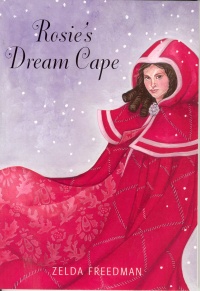| ________________
CM . . .
. Volume XII Number 7 . . . .November 25, 2005
excerpt:
Rosie Swedlove's true story is told lovingly and faithfully in this fictionalized account by her daughter, Zelda Freedman. It is an immigrant story as well as a Canadian story - people swept up in the maelstrom of world politics and deposited on foreign shores where they picked up the pieces and did whatever they could to survive. Rosie lives with her grandmother, Bubba Sarah, over a flower shop in Kensington Market in Toronto, a place where Russian Jewish immigrants congregated. Her mother, a prominent ballet dancer in Odessa, Russia, had been arrested and probably murdered by Cossacks, the notoriously brutal soldiers who were unleashed by the Czars to terrorize the population. The anti-Semitic sentiments of Russian society made Jews a constant target, and so Rosie and her grandmother fled to Canada. Now Rosie, at age 11, must work to support her aged and infirm grandmother. Education is not a possibility. She not only earns money to pay the rent but buys the groceries and does the chores. Rosie must toil long hours, six days a week in the shmatteh (garment) trade, sewing fine items for rich ladies to wear to the Royal Alexandra Theatre. Her boss and co-workers are also Jewish. Rosie suffers abuse at their hands, although the boss and one worker finally rally to support her against the lies of one of the other sewers. Freedman has captured very well the sights and sounds of the sewing factory in the nineteen teens and twenties. Her descriptions of Yitzy, her co-workers Fenya and Gitel, are very real. Their dialogue, from Yitzy's grunts to Fenya's taunts, will resonate with anyone who knew people from that era. The dangerous working conditions in the factory reflect the horrid and sometimes deadly situation in which "girls" toiled for decades. Rosie's yearnings to attend the ballet at the Royal Alexandra Theatre were the same as many of those disenfranchised by poverty. Her dream cape represents her past and her hopes for the future. Rosie's dilemma over the cape makes her grow as a character, advancing the plot and creating the possibility for resolution. Recommended. Harriet Zaidman is a teacher-librarian in Winnipeg, MB.
To comment
on this title or this review, send mail to cm@umanitoba.ca.
Copyright © the Manitoba Library Association. Reproduction for personal
use is permitted only if this copyright notice is maintained. Any
other reproduction is prohibited without permission.
NEXT REVIEW |
TABLE OF CONTENTS FOR THIS ISSUE
- November 25, 2005.
AUTHORS |
TITLES |
MEDIA REVIEWS |
PROFILES |
BACK ISSUES |
SEARCH |
CMARCHIVE |
HOME |
